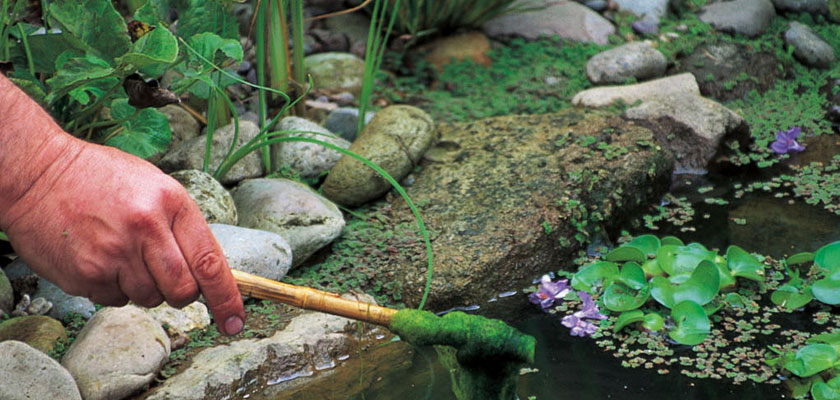21st Nov 2019
Blanketweed algae are species which form long fibrous strands and cling to the pond sides, waterfalls or pond plants. As well as spoiling the look of the pond, blanketweed can block pumps and filters and cause fish to become entangled.
Like suspended algae, blanketweed thrives when there are ample nutrients in the water and sunlight, however blanketweed is notorious for being very difficult to control and get rid of.Unlike suspended algae, blanketweed is not processed through a UVC and can not be controlled by regular filtration methods. In fact, having a well filtered pond will usually improve the conditions for blanketweed. The water will be clearer improving photosynthesis, and there will be ample nitrate as a by-product of the biological filtration and less suspended algae to compete for them.Blanketweed can be partially removed manually, either by hand or using a stick or specifically designed brush. Before using any treatments it is advised to remove as much as possible as the sudden increase of dead blanketweed from using a successful treatment may overload the filtration system. Cleaning Out Blanket Weed
Cleaning Out Blanket Weed
As with suspended algae, there are chemical solutions available, again these can be a bit hit-and-miss and it may take a few attempts to find a solution which works for your pond’s strain of algae. Barley straw is an age-old and completely organic remedy for blanketweed treatment. As barley straw rots down in the pond it releases an enzyme which breaks down the cell wall of many strains of blanketweed algae. This enzyme is also available as an extract. As with chemical solutions, barley straw doesn’t affect all types of blanketweed so while some pond owners swear by it, others find it useless.Some very efficient filtration products, such as the Velda T-tronic, release copper ions into the pond water. Copper ions destroy the algae cells and, if used properly, will rid the pond of blanketweed. These products must be used to the manufacturer’s recommendations as it is possible to overdose the pond with copper, which at high levels can be toxic to pond wildlife. This method can not be used in ponds where salt is used as a tonic, or if there are amphibians or invertebrates present, as copper is lethal to these animals, even in the smallest dosage.


